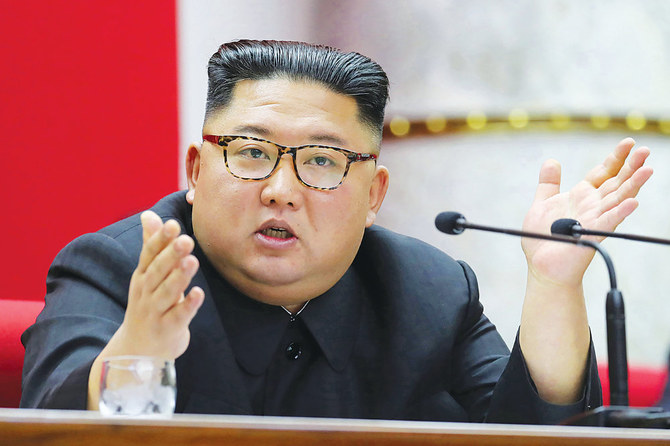ISTANBUL: The Democratic People’s Republic of Korea (DPRK) continues to be an object of fascination for international news junkies amid the saturation media coverage of the coronavirus pandemic.
Unlike in the past, however, when the country’s missile and nuclear weapons program was invariably the center of attention, this time it is the health of its leader, Chairman Kim Jong Un. Kim’s unexplained absence for nearly 21 days from April 11 fueled speculation that he had been incapacitated, either by COVID-19 or as a result of a botched surgery.
In the first week of this month, speculation about his wellbeing was revived by video footage of the leader speaking during a ribbon-cutting ceremony in a newly opened fertilizer factory located north of Pyongyang.
Now, Kim seems to have repeated his disappearing act; he has not been publicly seen for the past two weeks.
Compounding fears about the future of the DPRK has been the emergence of COVID-19 cases in towns along the border with China. Beijing has sealed off cities in the northeastern Jilin province as a new cluster of cases threatens to undermine its containment of the pandemic.
In all likelihood, Kim is keeping his distance from Pyongyang due to a suspected COVID-19 outbreak across the country.
Experts have expressed skepticism about North Korea’s claim of “zero infections,” attributing it to the country’s reluctance to admit disease outbreaks, its weak medical infrastructure and extreme sensitivity to any potential threat to Kim’s rule. Also undermining the claim is the donation of 1,500 COVID-19 test kits to North Korea from Russia in February.
Observers say similar kits had been shipped there from China. A few relief agencies, notably UNICEF and Doctors Without Borders, are said to have dispatched gloves, masks, goggles and hand hygiene products to North Korea.
Experts have also noted that Kim’s health problems — obesity, heavy smoking and drinking, and a family history of kidney and heart disease — put him at higher risk for severe illness if he were to contract the virus.
US President Donald Trump has publicly wished Kim good health, highlighting the importance that Washington still places in reaching what could very well be a legacy-making peace deal with Pyongyang.
Talks have stalled since the two leaders met a year ago in the world’s most fortified demilitarized zone between the two Koreas, where President Trump made history by becoming the first sitting American president to enter North Korea.
There was much hope then that a peace deal centered around the country’s nuclear program could gain momentum.
Though there are no signs yet that the DPRK is ready to enter into long-term talks, there has been a notable decrease in tensions and threats that could destabilize the Korean Peninsula.
Despite his intermittent disappearances, Kim’s proof of life has been essentially established.
The heightened speculation during April as to whether Kim was alive or dead underscored the fragility of the world’s knowledge on what would happen to the DPRK without him at the helm. And the truth is no one really knows.
Quoting Washington Post reporter Anna Fifield, the US journal, Foreign Affairs, states that Kim is considered physically weak for his age by South Korean doctors who have analyzed footage of him at summits. “Although he is only 36, Kim’s premature death is a real possibility, which means that North Korea could undergo a leadership transition at any moment,” Katrin Fraser Katz and Victor Cha write in the Foreign Affairs essay.
“No one knows who would take charge of North Korea if that happened or how long a new hierarchy would likely take to consolidate its power.”
A rapid collapse or internal fighting between competing factions that could result from Kim’s untimely demise without a clear succession plan in place would no doubt cause a security dilemma for the whole world.
FASTFACTS
- Kim Jong Un vanished from public view for about six weeks in 2014 before resurfacing with a cane.
- The North Korean leader disappeared again for nearly three weeks this year starting from April 11.
- A likely successor is younger sister, Kim Yo Jong, who could maintain the family bloodline.
Recently, 38 North, a respected source of detailed analysis on the DPRK, highlighted the danger of a rapid collapse in the country.
“Among all the challenges associated with a North Korean collapse, the use of weapons of mass destruction (WMD) or movement of WMD out of the country will have the largest strategic implications,” it said.
“The extensive size and complexity of North Korea’s nuclear, chemical and biological (NBC) weapons programs make it virtually impossible for the alliance between the United States and the Republic of Korea to have 100 percent clarity of intelligence and greatly increases the likelihood that regime forces, individual opportunists, fleeing members of the regime leadership or breakaway separatists could gain access to WMD.”
A flare-up between the two Koreas would likely lay South Korea’s capital Seoul to waste, wreak havoc with the lives of its ten million inhabitants, and lead to a major humanitarian catastrophe.
Against this tense backdrop, Trump should be commended for continuing to take bold steps towards preventing a devastating war from breaking out on the Korean Peninsula.
Diplomatic outreach to Pyongyang could eventually neutralize the very real threat of nuclear-tipped inter-continental ballistic missiles reaching major American cities on the west coast.
Trump’s Kissinger-style direct approach to Kim has laid the foundation for what could prove to be a turning point in the annals of Washington’s Korea policy.

A student undergoes a temperature check at the Pyongyang Medical University in North Korea in April. (AFP)
And with the pandemic ravaging large expanses of the world, diplomatic engagement between the two countries is needed now more than ever.
Normalizing bilateral relations, establishing new lines for trade in addition to humanitarian assistance and ushering in a new era of prosperity for the people of the DPRK who badly need it, is a vision that offers long-term security assurances for both the American and Korean people.
What is more, bringing North Korea into the fold of responsible nation states may be the best insurance against the transfer of knowledge and technologies related to ballistic missiles and nuclear weapon components to rogue Middle East actors such as Iran and Syria, with whom the regime has had historical partnerships.
The White House should therefore continue to seek a comprehensive peace deal with the DPRK as a diplomatic priority, particularly during the coronavirus pandemic.
Now more than ever, Kim’s hollowed-out economy needs access to global investment and finance. A deal with Washington and Seoul can make that a reality.
It would be a worthwhile initiative not just from the standpoint of Trump’s presidential legacy, but also for its potential for eliminating a longstanding source of geopolitical instability.
















